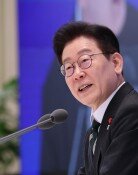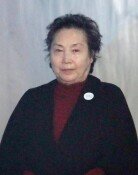[Editorial] Inter-Korean Talks: Hollow Rhetoric
[Editorial] Inter-Korean Talks: Hollow Rhetoric
Posted April. 24, 2005 23:36,
Prime Minister Lee Hae-chan has reportedly agreed on the need to resume inter-Korean dialogue when he met with North Korea`s nominal head of state Kim Yong Nam on the sidelines of the Asia-Africa summit. When Prime Minister Lee suggested the North and South reopen the inter-Korean official-level meeting, which had been suspended since last July because the South banned the visit to North to commemorate the 10-year anniversary of the death of the Norths founding father, Kim Il Sung, Chairman Kim agreed with him, stressing the principle of coexistence.
We do not know how much this consensus between the two will contribute to the development of inter-Korean talks, but it seems to be hollow. In this situation, any talks will not be meaningful unless they help resolve the North Korean nuclear issue. With speculation over the U.S. setting June as the deadline, evidence shows that the U.S. is already considering referring the nuclear issue to the U.N. Security Council and imposing economic sanctions against the North. U.S. Assistant Secretary of State for East Asian and Pacific Affairs Christopher Hill also hinted that Washington would seek other ways if Pyeongyang continued to refuse six-party talks. As such, the situation is very risky.
Lee suggested that Seoul would not spare support only if Pyeongyang accepted the talks when he told Kim: Well be able to find a way to use the Inter-Korean Cooperation Fund only when official-level talks are resumed. He added, I hope the six-way talks can serve as an opportunity to resolve the Norths nuclear issue. South Korean and China and others will work together to create such an environment.
Prime Minister Lees passion for the success of the inter-Korean and six-party talks is understandable, but it concerns us how these remarks may be deemed by the U.S., which is the key to resolving the Norths nuclear ambitions, as well as one of the parties to R.O.K-U.S. alliance. What is more, North Korea is currently suspected of reprocessing spent fuel rods again to produce plutonium since it suspended the operation of its five-MW reactor in Yongbyun this month. The U.S. Wall Street Journal also reported that North Korea is gearing up for a nuclear experiment.
There are priorities in every matter, and the most pressing issue at present is the Norths nuclear issue. Not only diplomacy and security, but also the economy will not go smoothly unless this issue is addressed. Therefore, we should see the big picture. Lees remarks seem to be at odds with the current complicated and multi-faceted developments surrounding the North Korean nuclear issue.



![[속보]한덕수 1심 징역 23년 선고…“내란 가담자 중벌 불가피”](https://dimg.donga.com/c/138/175/90/1/wps/NEWS/IMAGE/2026/01/21/133201789.1.jpg)


![[속보]한덕수 1심 징역 23년 선고…“내란 가담자 중벌 불가피”](https://dimg.donga.com/c/138/175/90/1/wps/NEWS/IMAGE/2026/01/21/133202388.1.jpg)
